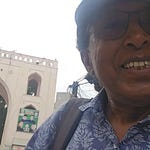As I noted in an earlier note last week, this piece offers a reflection on the role and condition of African parliaments, through the lens of my recent visit to both the old and newly built parliaments of Zimbabwe. These contrasting spaces serve not only as architectural landmarks, but as symbols of deeper political transitions, aspirations, and contradictions that echo across the continent. Second part of video clip is in Somali language, and I am assuming you have access to one of those Ai extensions in your browsers that automatically auto-translate from one language to another. No?
Reflections on Parliamentary Legacy: In a related reflection, as I previously indicated that I would share my thoughts on the role and legacy of African parliaments. My aim is to evolve these writings from being simply forums for intellectual exchange to becoming vehicles for civic action. History matters, and the establishment of a national archive for Somalia would not only honor our past but empower future generations.
Walking through the old Zimbabwean Parliament, I was deeply moved by its symbolic significance, just decades ago, it was the site of Ian Smith’s Unilateral Declaration of Independence (UDI). This space serves as a historical reminder for all Somalis and a call to ensure our national legacy is not lost. For those who are interested in that sad chapter of Zimbabwe’s history, here is what it was like; White folks Listens to Ian Smith's UDI Speech | Commemorate Rememberance Sunday | November 1965
A Note to Somali Federal Member States: While regional autonomy is a core principle of Somalia’s federal structure, any ambitions or movements toward secession are not only unconstitutional but dangerously destabilizing. The integrity and unity of the Somali Republic must remain non-negotiable. Efforts to fragment the nation under the guise of federalism threaten the collective progress, security, and sovereignty of all Somalis. Let history and reason guide our commitment to a unified, inclusive future.
I invite Somali parliamentarians to consider how they might contribute to a legacy that future generations can reflect on with pride. Moreover, perhaps we could also introduce systems that enhance transparency, such as recording attendance and participation in parliamentary sessions, see clip below from Zimbabwe.
To the Honourable Members of the Somali Parliament: The weight of history rests on your shoulders. You were not elected or appointed merely to occupy seats or recite scripted motions. You are the custodians of a nation that has endured immense suffering, survived chaos, and still dares to hope. It is your duty, not a favour, to respect your constitutional responsibilities, to attend sessions, to legislate with clarity and vision, and above all, to serve the Somali people with honesty and courage.
Somalia does not need passive observers in parliament. It needs leaders, men and women of resolve who will restore the dignity of our institutions, protect the sovereignty of the Republic, and build a legacy worthy of future generations. Do not be remembered as those who looked away while the country bled. Be the generation that rewrote our story with justice, unity, and honour. History will be kind to you only if you deserve it. Make your chapter one of courage, not of complacency.
In closing, I would like to bring attention once more to the idea of a Somali School of Government, which could play a foundational role in institutionalizing the values, history, and competencies needed for effective leadership.
Comments, feedback as always welcome.














Share this post